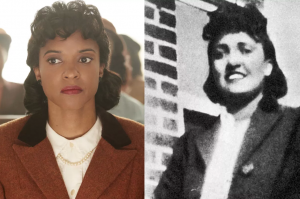The Immortal Life of Henrietta Lacks (2017)
The Immortal Life of Henrietta Lacks is nonfiction, drama television film directed by George C. Wolfe, which starred Oprah Winfrey as Henrietta Lacks’ daughter, Deborah Lacks. [1] This movie takes time after the death of a black woman, named Henrietta Lacks, because of cervical cancer. Although she has to succumb to the disease which resulted in Henrietta’s death, it is later discovered that parts of her outlive her. Those tiny parts of her then change the course of cancer treatment.
Plot
In 1951, Henrietta Lacks found a virulent form of cervical cancer in her body. At that time, the Head of Tissue Culture of Johns Hopkins Hospital is asked to collect the tissue culture of all cervical cancer patients, Lacks included. No human cells had ever survived long in a laboratory, but Lacks' cancer cells, which Gey labelled as HeLa, survived.
Since Gey gives samples of HeLa cells to every researcher at no expense, scientists are then able to carry out unparalleled disease and genetic studies in HeLa cell culture. This creation would then help geneticists identify distinct genetic markers in HeLa cells, which will help to identify the infected culture quickly. When the Lacks family were approached by a geneticist at Hopkins, they do not understand the purpose of the actions. Deborah thought they were given a cancer screening, given the history of her mother.
Due to the promising production of HeLa cells, the media spread the tale of the immortal cell culture, which leads to the news of the Lacks family. The Lacks family is appalled to hear that Henrietta's cells benefited other people. When this news is highlighted by the media as wide as the BBC documentary, a conman, Sir Lord Cofield, is attracted to the Lacks family. He exploited the family's court actions and took legal action against the Lacks family. Such an ordeal accumulates tension in Deborah Loses, where she received a stroke afterwards.
As a daughter, Deborah only wishes to learn more about her mother as a person, not just as an object of study. Knowing Deborah’s wishes, Rebecca Skloot who is an American science writer approaches the family. She promises to share the results of her research to the Lacks family, where Skloot writes about the journey of this discovery in a book with the same title. Deborah gets a chance to see the HeLa cells divide under a microscope in real-time and she wishes to learn more about science. However, in 2009, Deborah died, just as Skloot is about to make final touches on the book before publishing it.
Controversy
Amidst the great medical discovery that HeLa cells are able to unveil, Henrietta’s story plays as an example of scientific racism. In the 20th century, many physicians felt that using public ward patients as test subjects was an equal reward for the care they got. We may infer that black Americans such as Henrietta, have been highly influenced by the practice of taking cell culture without their permission or consent. [2]
With the lack of consent from Henrietta, the Lacks family could have proceeded with a lawsuit. However, Skloot shares that the Lacks family couldn’t afford legal counsel at that time. It’s ironic, while the world has benefited from the HeLa cells, the Lacks family still can’t afford medical costs for their illnesses. This condition has been made worse by racialized poverty, where, unfortunately, the Lacks family have to live deeply in. The Lacks family deserve to receive sufficient incentives for those cells which were originated from Henrietta’s body, as they have led essential medical studies that impact a lot of people in the future.
